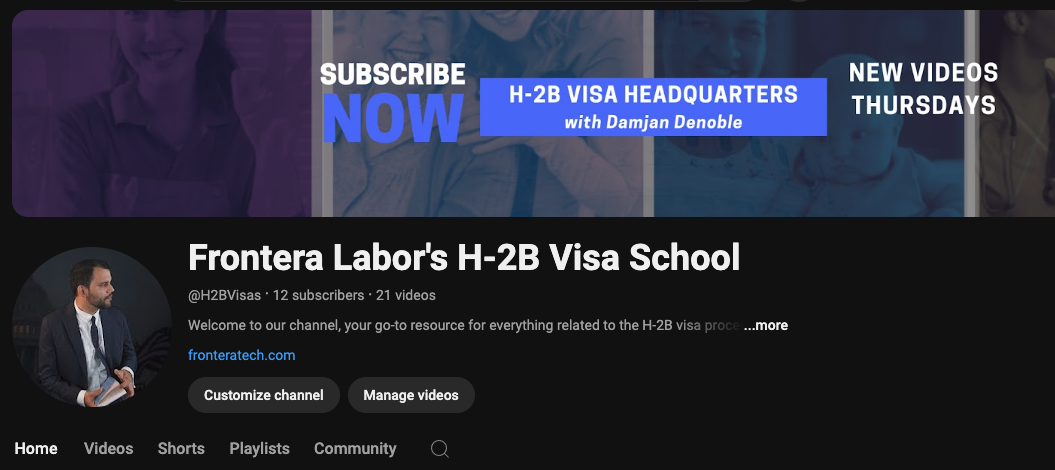At Frontera Labor, we strive to keep our clients informed about significant developments in immigration law that can impact their visa applications. One such pivotal decision is the Helping Hands II case (BALCA Case No. 2024-TLN-00066) by the Board of Alien Labor Certification Appeals (BALCA). This decision not only reversed a denial by the Department of Labor (DOL) but also set a crucial precedent for H-2B caregiver visas. Here, we provide a comprehensive analysis of the Helping Hands II decision, detailing how the court reached its conclusion and the broader implications for families and businesses seeking caregiver visas.
Background of the Helping Hands II Case
Helping Hands of North Carolina, LLC sought to hire two Home Health Aides under the H-2B visa program to provide 24-hour care for a family member with severe medical needs. The family member, referred to as Jane Doe (a pseudonym), suffers from a terminal medical condition that requires constant care. Initially, the DOL denied Helping Hands’ application, citing deficiencies in establishing the temporary nature of the need for caregivers.
Employment_and_Train_v_Helping_Hands_of_Nor_2024TLN00066_(DEC_06_2023)_120123_CADEC_PDKey Issues in the Case
The primary issue revolved around whether Helping Hands could qualify for a one-time occurrence need under the H-2B visa program despite having previously employed part-time caregivers. The DOL’s Certifying Officer (CO) argued that the employer had not adequately demonstrated that the need for caregivers was temporary and that prior part-time employment might indicate an ongoing requirement, thereby disqualifying the application.
Helping Hands’ Response to the Denial
In response to the Notice of Deficiency (NOD) issued by the DOL, Helping Hands collaborated with Frontera Labor to strengthen their case. Their response focused on two main points:
- Clarifying Temporary Need:
- Helping Hands emphasized that their previous use of part-time caregivers was to supplement the care provided by Jane Doe’s mother. Due to Cecilia’s advanced age and health issues, the need shifted from part-time to full-time caregivers.
- They provided detailed medical documentation from Jane Doe’s primary care physician, establishing a clear end-of-life period of 1-3 years. This documentation was crucial in defining the temporary and finite nature of the caregiving need.
- Distinguishing Caregiver Roles:
- Helping Hands clarified that their prior employment of an au pair was fundamentally different from the full-time nanny position they were now seeking to fill. The au pair’s role was limited in scope and hours, whereas the nanny’s responsibilities required full-time, expanded duties, including meal preparation and weekend care.
BALCA’s Analysis and Decision
Upon reviewing the case, BALCA undertook a thorough examination of the arguments and evidence presented by Helping Hands. The Board’s decision hinged on several critical factors:
- Precedent from Helping Hands I:
- In Helping Hands I (BALCA Case No. 2023-TLN-00059), BALCA had previously ruled that the prior employment of part-time caregivers did not disqualify an employer from establishing a one-time occurrence need for full-time caregivers. Helping Hands II built upon this precedent, reinforcing that a shift from part-time to full-time care could meet the temporary need requirement.
- Adequate Medical Documentation:
- The comprehensive medical records and the letter from Dr. Yoder provided clear evidence of Jane Doe’s terminal condition and the necessity for full-time care within a defined timeframe. This documentation satisfied the regulatory standards for establishing a temporary need under the H-2B program.
- Change in Caregiving Needs:
- BALCA recognized that Helping Hands had experienced a genuine and significant change in caregiving requirements. The transition from part-time to full-time caregivers was driven by Jane Doe’s deteriorating health and Cecilia’s inability to continue providing care alone.
- DOL’s Inconsistent Adherence to Precedent:
- BALCA noted that the DOL’s CO failed to acknowledge the established precedent from Helping Hands I and other relevant cases. This oversight suggested a broader issue within the DOL, where officers might not consistently follow BALCA’s rulings unless compelled by robust legal arguments.
Final Ruling
BALCA reversed the DOL’s denial and remanded the case for certification, concluding that Helping Hands had adequately demonstrated a one-time occurrence need for full-time caregivers. The Board emphasized that:
- Prior Part-Time Employment Does Not Preclude One-Time Need: The shift from part-time to full-time caregivers, supported by medical documentation, meets the one-time occurrence standard.
- Medical Evidence is Crucial: Detailed and specific medical records are essential in establishing the temporary nature of the caregiving need.
- Precedent Must Be Followed: The DOL must adhere to BALCA’s precedents, ensuring fair and consistent application of immigration laws.
Implications of the Helping Hands II Decision
The Helping Hands II decision has several important implications for the H-2B visa program, particularly for caregiver visas:
- Enhanced Flexibility for Employers:
- Employers can transition from part-time to full-time caregiving roles without disqualifying their H-2B applications, provided they can demonstrate a clear, temporary need supported by medical documentation.
- Importance of Comprehensive Documentation:
- Detailed medical records and clear evidence of the caregiving need’s duration are critical in securing H-2B visas. Employers must ensure that their applications are well-supported to meet regulatory standards.
- Setting a Positive Precedent:
- This decision sets a favorable example for other families and businesses, illustrating that with the right evidence and legal support, securing H-2B visas for full-time caregivers is achievable even if part-time arrangements existed previously.
- Highlighting DOL’s Adherence Issues:
- The case underscores the need for employers to work with experienced legal counsel to ensure that the DOL adheres to established BALCA precedents, avoiding potential inconsistencies in the application of immigration laws.
How Frontera Labor Can Assist You
At Frontera Labor, we leverage our deep understanding of cases like Helping Hands II to support our clients effectively. Here’s how we can assist you:
- Personalized Guidance: We take the time to understand your unique situation and tailor our approach to meet your specific needs.
- Expert Advocacy: Our team uses landmark cases like Helping Hands II to build strong, compelling applications that clearly demonstrate your temporary need for caregivers.
- Comprehensive Support: From gathering essential documents to managing the entire application process, we handle every detail to ensure a smooth experience.
- Appeal Assistance: If your application faces challenges, we guide you through the appeals process, using proven strategies to enhance your chances of success.
- Innovative Legal Solutions: We utilize the latest legal technology to streamline the visa process, making it efficient and accessible for our clients.
Conclusion
The Helping Hands II decision represents a significant advancement in the H-2B visa landscape, particularly for families and businesses seeking caregiver visas. By affirming that prior part-time caregiver arrangements do not hinder the eligibility for one-time occurrence needs, BALCA has provided a clearer, more flexible pathway for those in need of full-time caregiving support.
At Frontera Labor, we are committed to leveraging such landmark decisions to help our clients secure the necessary visas. Whether you are a family seeking to hire a nanny or a business needing temporary foreign workers, we are here to provide the expertise and support you need to navigate the H-2B visa process with confidence and success.





